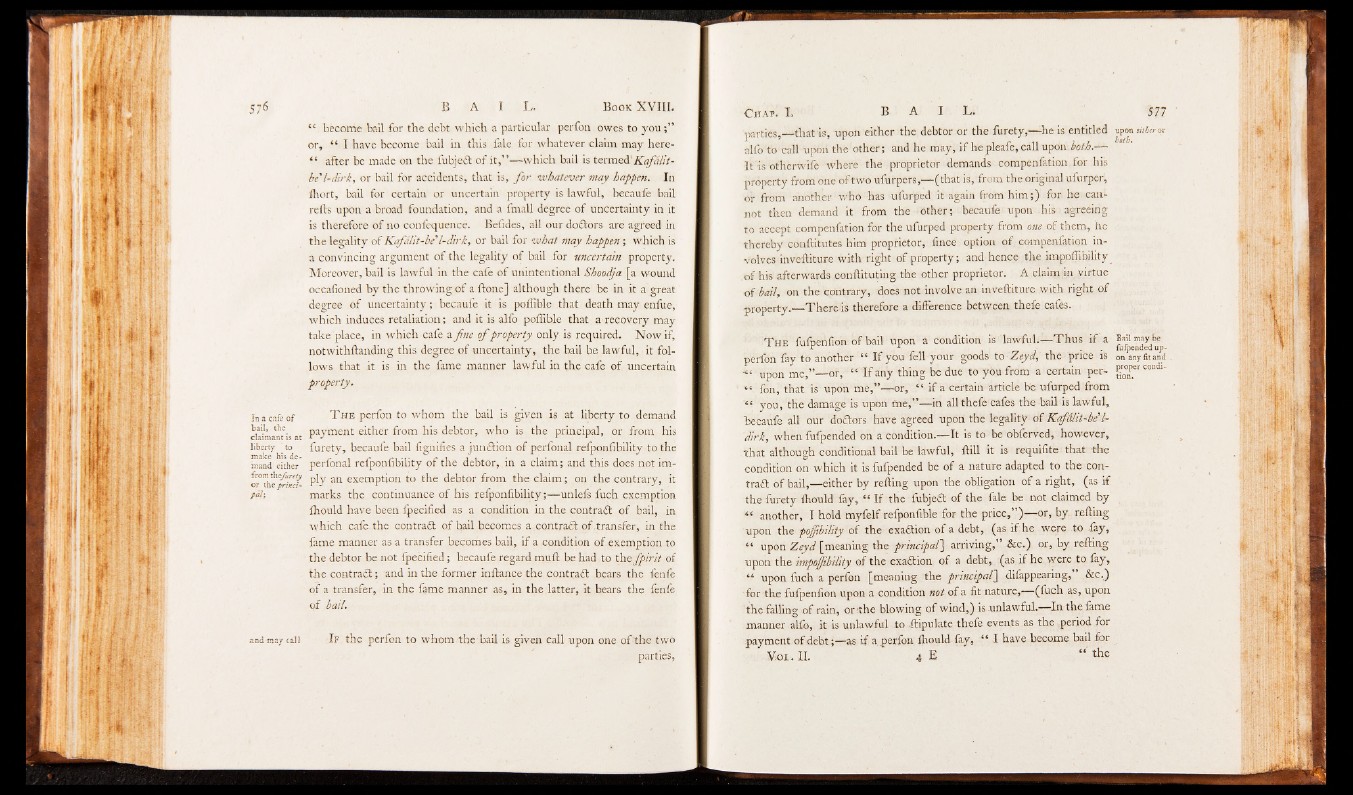
“ become bail for the debt which a particular perfon owes to you;”
or, “ I have become bail in this fale for whatever claim may here-
“ after be made on the fubject of it,” — which bail is termed'Kqfalit-
be'l-dirk, or bail for accidents, that is, fo r 'whatever may happen. In
Ihort, bail for certain or uncertain property is lawful, becaufe bail
refts upon a broad foundation, and a fmall degree of uncertainty in it
is therefore of no confequence. Befides, all our doctors are agreed in
the legality of Kafdlit-be' l-dirk, or bail for what may happen; which is
a convincing argument of the legality of bail for -uncertain property.
Moreover, bail is lawful in the cafe of unintentional Shoodja [a wound
occafioned by the throwing of a ftone] although there be in it a great
degree of uncertainty; becaufe it is poflible that death may enfue,
which induces retaliation; and it is alfo poflible that a recovery may
take place, in which cafe a fine o f property only is required. Now if,
notwithftanding this degree of uncertainty, the bail be lawful, it follows
that it is in the fame manner lawful in the cafe of uncertain
property.
In a cafe of T he perfon to whom the bail is given is at liberty to demand
bail, the payment either from his debtor, who is the principal, or from his
liberty y o furety, becaufe bail fignifies a jundtion of perfonal relponfibility to the
biand either perfonal relponfibility of the debtor,,in a claim; and this does not im-
fromthe/irr/j. ply an exemption to the debtor from the claim;or theprinci- r -J r - _ _ on the contrarVy,’ it
/W; marks the continuance of his relponfibility;— unlefs fuch exemption
Ihould have been fpecified as a condition in the contradt of bail, in
which cafe the contradt of bail becomes a contradt of .transfer, in the
lame manner as a transfer becomes bail, if a condition of exemption to
the debtor be not fpecified; becaufe regard mull be had to thefpirit of
the contrail; and in the former inftance the contradt bears the fenfe
of a transfer, in the fame manner as, in the latter, it bears the fenfe
of bail.
and may call If the perfon to whom the bail is given call upon one of the two
parties,
parties._that'is, upon either the debtor or the furety,— he is entitled upon«v/»qr
■ ii • r i a r 11 . 7 » both. alfo tb call upon the other; and he may, if hepleate, call u p o n . —
It is ntherwife where the proprietor demands compenfation for his
property from one oftwo ufurpers,— (that is, from the original ufurperj
or from another who has -ufurped it again from him;) for he cannot
then demand it from the Other; becaufe; upon .his > agreeing
to accept compenfation for the ufurped property from one of them, he
thereby conftitutes him proprietor, fince option of. compenfation involves
inveftiture with right of property; and hence the imppflibility_
.of his afterwards conftituting the other proprietor. A claim in virtue
of bail, on the contrary, does not involve an inveftiture with right of
property.— There is therefore a difference between thefe cafes.
T he fufpenlion of bail upon a condition ^ law fu l.— Thus if a
perfon fay to another “ If you fell your goods: to Zeyd, the price is on any fit and
upon me,”— or, “ I f any thing be due to you from a certain per- ^°£ercondi'
fbn, that, is-upon me,”— or, “ if a certain article be ufurped from
“ you, the damage ® upon the,”— in all thefe cafes the bail is lawful,
becaufe all our dodtors have agreed upon the legality óf Kafdlit-bdl-
dirk, when fufpended on a condition.— It is to be obferved, however,
that although conditional bail be lawful, ftill it is requifite that the
condition on which it is fufpended be of a nature adapted to the contradt
óf bail,— either by refting upon the obligation of a right, (as if
the furety Ihould fay, “ If the fubjedt of the fale be not claimed by
another, I hold myfelf refponfible for the price, )— or, by. refting
upon the pojfibility of the exadtion of a debt, (as if he were to fay,
“ upon Zeyd [meaning the principal] arriving,” &c.) or, by refting
upon the impojjibdtty of the exadtion of a debt,. r(as..if he. were to fay,
“ upon fuch a perfon [meaning the principalJ difappearing,” &c.)
for the fufpenfion upon a condition not of a fit nature, (fuch as., upon
the falling of rain, or 'the blowing of wind,) is .unlawful. In the fame
manner alfo, it is unlawful to flipulate thefe events as the period for
payment of debt;—as if a perfon Ihould fay, “ I have become bail for
V o i . II. 4 E “ the